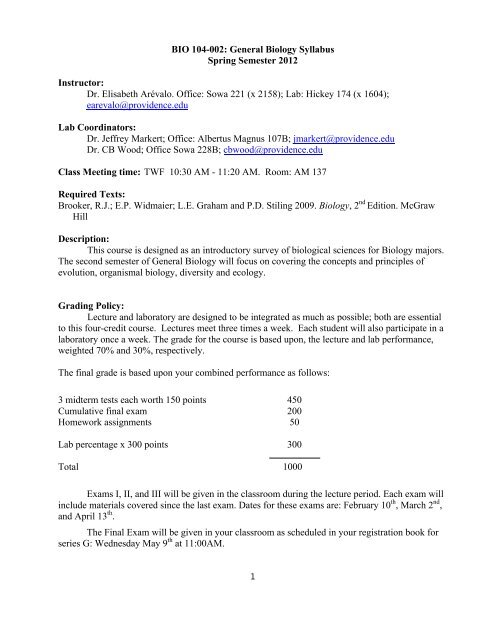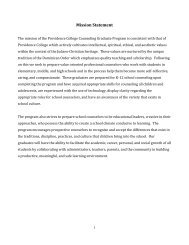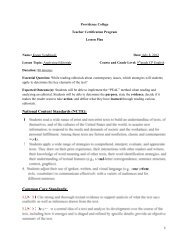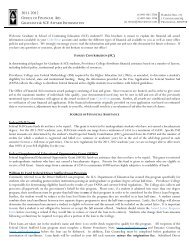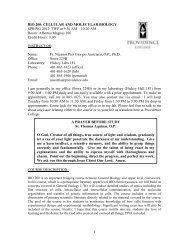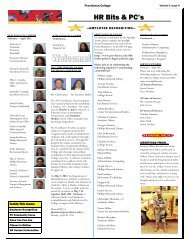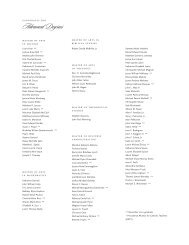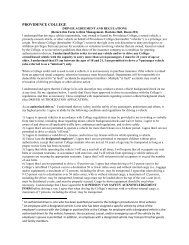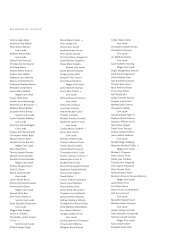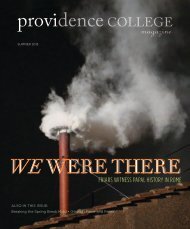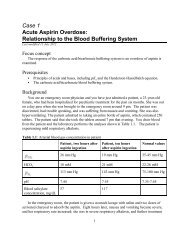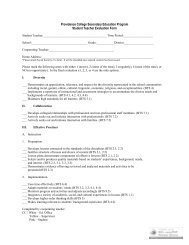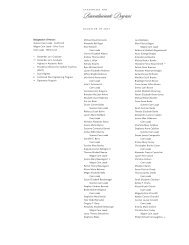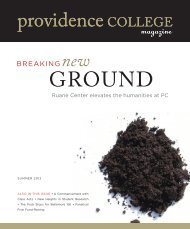BIO104 Syllabus - Providence College
BIO104 Syllabus - Providence College
BIO104 Syllabus - Providence College
Create successful ePaper yourself
Turn your PDF publications into a flip-book with our unique Google optimized e-Paper software.
BIO 104-002: General Biology <strong>Syllabus</strong><br />
Spring Semester 2012<br />
Instructor:<br />
Dr. Elisabeth Arévalo. Office: Sowa 221 (x 2158); Lab: Hickey 174 (x 1604);<br />
earevalo@providence.edu<br />
Lab Coordinators:<br />
Dr. Jeffrey Markert; Office: Albertus Magnus 107B; jmarkert@providence.edu<br />
Dr. CB Wood; Office Sowa 228B; cbwood@providence.edu<br />
Class Meeting time: TWF 10:30 AM - 11:20 AM. Room: AM 137<br />
Required Texts:<br />
Brooker, R.J.; E.P. Widmaier; L.E. Graham and P.D. Stiling 2009. Biology, 2 nd Edition. McGraw<br />
Hill<br />
Description:<br />
This course is designed as an introductory survey of biological sciences for Biology majors.<br />
The second semester of General Biology will focus on covering the concepts and principles of<br />
evolution, organismal biology, diversity and ecology.<br />
Grading Policy:<br />
Lecture and laboratory are designed to be integrated as much as possible; both are essential<br />
to this four-credit course. Lectures meet three times a week. Each student will also participate in a<br />
laboratory once a week. The grade for the course is based upon, the lecture and lab performance,<br />
weighted 70% and 30%, respectively.<br />
The final grade is based upon your combined performance as follows:<br />
3 midterm tests each worth 150 points 450<br />
Cumulative final exam 200<br />
Homework assignments 50<br />
Lab percentage x 300 points 300<br />
Total 1000<br />
Exams I, II, and III will be given in the classroom during the lecture period. Each exam will<br />
include materials covered since the last exam. Dates for these exams are: February 10 th , March 2 nd ,<br />
and April 13 th .<br />
The Final Exam will be given in your classroom as scheduled in your registration book for<br />
series G: Wednesday May 9 th at 11:00AM.<br />
1
NOTE: Please read this paragraph carefully as it represents firm course policy. Anyone who<br />
misses one of the in-class exams must take the make-up exam or receive a zero for the missed exam<br />
grade. The make-up will substitute for the missed earlier exam. There will be no substitute exam<br />
times or other make-up exams, so do not skip any exam unless absolutely necessary. Under no<br />
circumstances will missed exams be made up unless I am notified prior to the exam. There are<br />
NO make-up exams scheduled, without a note from a Doctor, the Dean or prior discussion with me.<br />
The make-up exam is scheduled from 10:00-10:50 AM on the first day of the reading period at the<br />
end of the semester (May 5 th ).<br />
Homework Assignments:<br />
You will be assigned weekly online questions for the chapters covered that week from our e-<br />
textbook software. You will answer the questions online and will receive a grade for the<br />
completion of the assignment. The assignments will be posted online (McGraw Hill Connect site<br />
for class: http://connect.mcgraw-hill.com/class/e_arevalo_spring_2011) every Monday and will be<br />
due every Friday at midnight. Late assignments will not be accepted.<br />
Homework assignments will also involve some problems (i.e. calculations of Hardy-<br />
Weinberg equilibrium) assigned during lecture or extra-credit points for attending Department<br />
seminars.<br />
Expectations:<br />
Lectures and laboratories are composed to facilitate your learning biology. Attendance is<br />
expected. Each instructor in the course has her/his own policy with regards to attendance. My<br />
policy is as follows:<br />
Attendance to lecture and lab is expected. Your performance in the course depends on<br />
learning material from your text as well as lecture and laboratory. Missed sessions will in all<br />
likelihood adversely affect your performance and probably your grade. If you do not understand<br />
something and have been missing classes, don't be surprised.<br />
Lectures will be presented generally using Microsoft PowerPoint, and the slides presented<br />
in class will be available for you to view from the Angel’s site for the course. You may find it<br />
useful to view the presentations BEFORE class and even to print copies of the slides that will be<br />
presented to facilitate your note taking and to study from after class. However, the PowerPoint<br />
notes will not replace the assigned readings from the textbook or coming to class, i.e, there will be<br />
testable material from other sources than the slides.<br />
Office Hours<br />
Office hours are available for substantive questions or concerns you may have about the<br />
course. Please do not call or e-mail with questions that can readily be answered by your syllabus.<br />
Remember that the syllabus is available on the course web page in Angel.<br />
I will be available Monday, Wednesday and Friday from 1:30 – 3:30PM, in my office (Sowa<br />
221) or in my lab (Hickey 174), and accessible by e-mail or phone. Please email me and make an<br />
appointment if you need to meet with me at a different time.<br />
2
The attached lecture schedule is, by necessity, tentative and may be adjusted, as I deem<br />
appropriate. Reading assignments are indicated and should be completed before coming to class.<br />
Additional assignments may be made as the semester progresses. Exam dates are fixed.<br />
BIO 104: General Biology<br />
Spring Semester 2012<br />
Lecture topic<br />
Chapter<br />
Introduction – Your expectations and mine -<br />
An Introduction to Evolution 23<br />
Population Genetics 24<br />
Origin of Species and Macroevolution 25<br />
Taxonomy and Systematics 26<br />
Protists 28<br />
Fungi 31<br />
Plants and the Conquest of Land 29<br />
Evolution & Diversity of Gymno/Angiosperms 30<br />
Introduction to Flowering Plant Form and Function 35<br />
Flowering Plants: Behavior 36<br />
Flowering Plants: Nutrition 37<br />
Flowering Plants: Transport 38<br />
Flowering Plants: Reproduction 39<br />
An Introduction to Animal Diversity 32<br />
The Invertebrates 33<br />
The Vertebrates 34<br />
Animal Bodies and Homeostasis 40<br />
Neuroscience 41-43<br />
Muscular-Skeletal Systems and Locomotion 44<br />
Nutrition, Digestion, and Absorption 45<br />
Control of Energy Balance, Metabolic Rate, and<br />
46<br />
Body Temperature<br />
3
Lecture topic<br />
Chapter<br />
Circulatory and Respiratory Systems 47 - 48<br />
Excretory Systems and Salt and Water Balance 49<br />
Animal Reproduction 51<br />
Immune Systems 53<br />
An Introduction to Ecology and Biomes 54<br />
Behavioral Ecology 55<br />
Population Ecology 56<br />
Species Interactions 57<br />
Community Ecology 58<br />
Ecosystem Ecology 59<br />
Biodiversity and Conservation Biology 60<br />
4
Academic Honesty Policy<br />
As students at <strong>Providence</strong> <strong>College</strong> you are expected to understand and follow standards of<br />
intellectual and academic integrity. The <strong>College</strong> and the professors in the Department of Biology<br />
assume that you will be honest and that you will submit only your own work. The General Biology<br />
faculty requires that you adhere to the level of honesty as outlined by the <strong>College</strong> and refrain from<br />
dishonorable or unethical behavior.<br />
Penalties for failure to adhere to academic policy:<br />
1. Exams or quizzes: For the first offense, the student will receive a zero for the assignment.<br />
If a student aids another student during the exam, both parties will receive a zero. For the<br />
second offense, the student will receive an F for the course.<br />
2. Lab reports or papers: For the first offense, the student will be asked to rewrite the<br />
assignment after a meeting with the appropriate faculty member in the course and will<br />
receive a “late” penalty of one letter grade. For the second offense, the student will receive<br />
a zero for the assignment. For any subsequent offense, the student will receive an F for the<br />
course.<br />
Students will be required to submit their papers electronically via Angel in the <strong>BIO104</strong> class site.<br />
Each paper will be screened with plagiarism software so it is in your best interest to write in your<br />
own words and reference the paper correctly.<br />
As required by the Dean of Undergraduate Students, all offenses will be reported to the Dean. In<br />
addition, all offenses will be recorded in the Department of Biology for future reference.<br />
<strong>Providence</strong> <strong>College</strong> Policy on Academic Honesty: “Acts of academic dishonesty (plagiarism,<br />
collusion, cheating, etc.) are subject to an appropriate penalty. The grade of “F” may be assigned to<br />
students found guilty of such acts. The professor of the course in which the infraction occurred will<br />
inform the Office of the Dean of Undergraduate Studies of the offense and the action taken.<br />
Students who earn a failing grade may petition a review by the Academic Appeals Committee. In<br />
addition, the Dean of Undergraduate Studies may refer any case of academic dishonesty to the<br />
Office of the Vice President of Student Services, which will judge whether further penalties should<br />
be assessed. A second offense against academic honesty renders students liable to automatic<br />
dismissal from the college.”<br />
5


